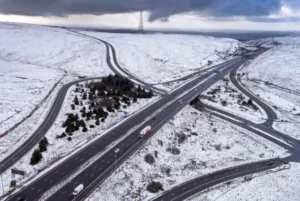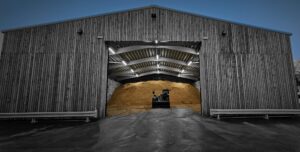More local authorities should be planning to plough ‘back to black’ on the road surface during snow events if they want to help deliver better performance and maintain safety on the network.
These are the thoughts of Debbie Cavanagh, UK Sales Manager for Safecote who says that alternative plough blade technology, now available to councils, which will help them achieve ‘back to black’ ploughing every time because of its more robust and durable design.
The ‘back to black’ ploughing technique is where all the snow is cleared by the blade from the network as apposed to the traditional method of leaving up to 10mm of snow on the surface. This has mainly been done in the past to protect the rubber blades from wearing out too quickly as well as the potential downtime lost by the spreader having to return to a depot during a snow event to have the plough blades replaced which can take considerable time.
Any snow left on the network can often lead to safety issues as the snow turns to ice as well as the cost of having to salt or re-salt any roads that haven’t been completely cleared, according to Ms Cavanagh.
Mark Watkins, Area Engineer at Monmouthshire County Council has used Kuper GK5 blades on his fleet for some time. He said: “We have saved an unbelievable amount of money on maintenance costs and downtime and we haven’t even replaced one set yet in four winters-even after dealing with the Beast from the East. The performance is superior and the costs saved on maintenance etc means they are well worth the investment,” he adds
Chapter Nine of the new NSWRG guidance published last year –Treatments for Snow and Ice-advises that when it is impractical to spread sufficient salt to melt anything other than very thin layers of snow and ice, and ploughing (or, in certain circumstances, cutting and blowing) is the only effective way to deal with more than a few millimetres of snow. It goes on to say that most effective ploughing technique is to plough down to the road surface ‘Ploughing to black’, as this removes almost all of the lying snow and minimises the amount of de-icer required for subsequent treatments. Equipment designed for this purpose, is available from manufacturers but the technique may not be suitable for all road surface types and/or conditions, it says.
Therefore, authorities should assess the suitability of ploughing down to the road surface for their networks and, if practicable and appropriate, employ this technique during their snow clearance operations. Preparation is essential – ploughs must be readied and in position before heavy snowfall if ploughing is to be effective, says the guidance.
The NWSRG is responsible for overseeing and coordinating winter service research and providing guidance for central and local government for all roads in the UK.
“Our Kuper GK5 ceramic plough blades can help local authorities achieve effective back to black ploughing every time they are used. They are much tougher than standard rubber blades-lasting up to 20 times longer and saving councils valuable downtime from spreaders being in the depot and not out on the network, especially during a major snow event. With this technology there is no reason why any snow and slush should be left on the network,” Ms Cavanagh told Highways News.
The Kuper GK5 blades offers the ability to plough any surface ‘back to black’ with the avoidance of damage to objects fixed to the highway including road studs, speed ramps, and iron works.
“We were finding the rubber blades were wearing very quickly and especially on the edges which often caused a ridge that was left on the network. Our high climatic domain means that during a snow event ploughing is essential especially in those high areas but although dependent on the season, we were going through several sets of blades and obviously there is an associated cost that comes with that and the downtime from the vehicle being off the road when blades need to be replaced,” said Stephen Aikman, Highways Operations Manager at Oldham Council. “
























